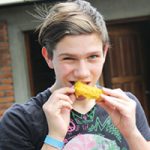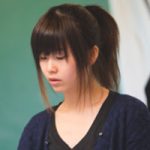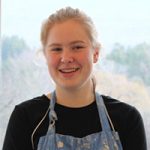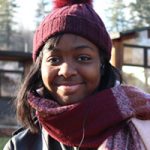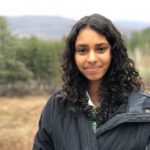Music and Drama
uxton offers a large and diverse range of performing arts options, from Western African dance to jazz ensembles to our annual All-School play. Through top-tier instruction by our art staff and the commitment of our students, we are able to offer a program that is both welcoming and high-caliber.
Students can take part in music, drama, and dance through both classes and afternoon and evening activities. All of the performing arts perform at our Fall and Spring Arts weekends, where family, friends, and the whole Buxton community get to celebrate their talent and hard work over the past term.
Counterpoint is the artful interplay of two or more melodic lines. In this class, we’ll take a historical view of how counterpoint has been written: what are the ‘rules’ of writing polyphonically (with multiple melodic voices), and how have those rules changed over time? We will experiment with writing counterpoint in a variety of different historical styles, from the simple harmonies of 12th century church songs, through the wildly ornate flourishes of the baroque period, into the angular and dissonant counterpoint practiced by modernist composers in the 20th century. We might even venture to formulate our own “rules” for writing polyphonic music. Students signing up for this class should know how to read music.
This is a music class for people who have little or no experience playing music. With that in mind, we’ll be taking a three pronged approach: listening, theorizing, and playing with simple instruments (hand percussion, recorder, voice, drum machine, synthesizer). Listening will be the core component of the course: we will listen deeply and widely, establishing some familiarity with the “canon” of Western art music and building an awareness of musical forms and approaches from other times and places. As we listen, we will develop a vocabulary with which to 1) describe what we hear and 2) conceptualize what we want to hear. Finally, and perhaps most importantly, we will play around with sound together. The goal of this class is not to become expert musicians or to create masterpieces, but to cultivate a playful attitude towards sound and to access the joy of making music with others.
Students who are interested in playing chamber music may participate in one of a number of group ensembles. They vary in size and instrumentation and are individually coached by the music faculty. Duos to seven-piece jazz ensembles form each semester to rehearse and perform student composers’ work as well as standard repertoire. Rudimentary sight-reading ability is necessary. Performances are given several times each year.
Chamber orchestra is open to all students who have an interest in playing music in a larger group. A wide variety of instruments can be accommodated in the chamber orchestra. Repertory works are performed during the Fall and Spring Arts Weekends, and in the winter the orchestra provides music for the touring All-School Play. Recent performances have included Bach’s Orchestra Suites in C and D, Handel’s Water Music, Mozart’s Eine Kleine Nachtmusik, and Schubert’s Rosamunde Overture; waltzes and rags by Scott Joplin; and arrangements of pieces by George Gershwin and Duke Ellington.
Choral activities and vocal ensembles are open to all regardless of prior experience. Twice a year, major choral works are undertaken. An additional piece involving all students and faculty is performed at Graduation. Vivaldi’s Gloria, Mozart’s Missa Brevis K.220 and Requiem K.626, Schubert’s Mass No. 3, Gounod’s Messe Solennelle de Sainte Cécile, and Carl Orff’’s Carmina Burana have been performed in recent years.
These productions are cast at the beginning of each term and involve students of all grades who wish to be considered for a part. There are no requirements for participation. Casting is at the discretion of the directors, but we strive to involve as many different students as possible. We also take into consideration the needs of the actors. One student might be ready for a challenge, so we will cast them in a difficult role on purpose. Another might be trying out for the first time and we want to celebrate their courage by giving them a small part. These plays rehearse two evenings a week, for two hours each time (though not all students are required to be at every rehearsal for the full two hours). Other students, as volunteers, are in charge of lights, sets, props, and costumes. Some of the work for these crews happens during the evening rehearsals, some happens during Work Program hours. Adults are involved in these crews as well, but students are, and need to be, the primary participants.
In this class, students will learn the fundamentals of music theory— pitch, rhythm, melody, and harmony. We will start the semester by learning to read and write traditional music notation, but we will prioritize ear training: cultivating our ability to hear, identify, and sing scales, modes, and intervals. Throughout the semester, students will have the opportunity to experiment with several different approaches to music composition and improvisation. Students need not have any prior musical knowledge to enroll in this course, as we will be starting from the very basics. Those with more advanced knowledge are welcome to participate, and will be challenged with material matched to their skill level.
This class is an introduction to theater tech, designed to teach students the skills and terminology of the various technical fields of live event and theater production. Topics covered will include light and sound design, costume design and construction, stage management, carpentry/set building, and prop making. Come prepared to learn an overview of each! This class is introductory, but is also open to students who have experience in one area of theater tech and want to learn more in an unfamiliar area.
Along with hands-on work in our theater, we will visit local theaters to see how they run their tech, and speak with professionals in various tech-related fields and positions.
Depending on the number of students, we will round out the term by designing a production (lights, sound, set, props, costumes, etc.) as a team.
Lessons in piano, voice, and most instruments can be arranged.









